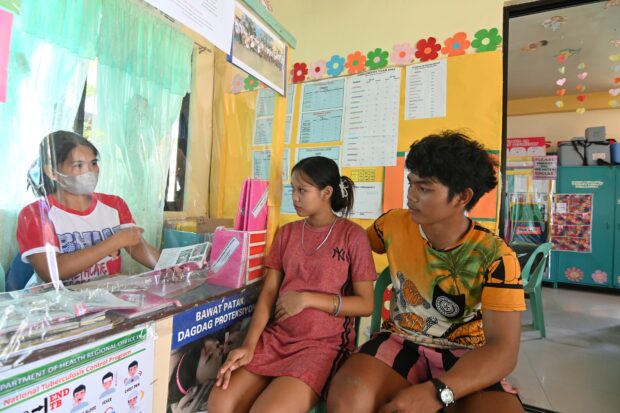
File photo shows a health professional in Dipolog City lecturing young parents as part of a program to reduce teen pregnancies and promote reproductive health. (PHOTO FROM ZUELLIG FAMILY FOUNDATION)
MANILA, Philippines — Two lawmakers have aired their displeasure over the slow response of the Department of Health (DOH), after officials admitted that the entire P873 million funds for the country’s reproductive health and family planning commodities in 2023 have not yet been utilized.
Albay 1st District Rep. Edcel Lagman and Iloilo 1st District Rep. Janette Garin took turns in chiding the DOH during the House committee on appropriations hearing on Thursday, after officer-in-charge and Undersecretary Maria Rosario Vergeire said that they are still in the pre-procurement stage.
The revelation came after Lagman asked how much of the P873.14 million funds for 2023 had been disbursed. According to Vergeire, the pre-bidding process is underway.
“It’s ongoing procurement, where we can be able to include this as part of our disbursements already (when) the items are delivered to them,” Vergeire said.
“With the indulgence of Congressman Lagman, Sec. Rosette, pre-bidding is not yet part of the procurement process,” Garin — a former DOH secretary herself — told Vergeire.
Vergeire eventually clarified that she meant that the items to be purchased can be considered part of “disbursed funds” when they have secured it from the suppliers.
Both lawmakers, however, lamented that DOH is still in the pre-bidding process when almost half of the year has gone by — with Garin being perplexed as the commodities that DOH should purchase are part of regular programs.
“It’s already May, and the Department of Health is still in the pre-bidding process,” Lagman said.
“That’s precisely my point Congressman Edcel Lagman, because this is not a new program, this is a regular program being done every year […] Look at the timeline, we are now May, wala pa kayong technical specifications on family planning contraceptives. Kung matapos man ‘yan middle of the year, you will start procurement, and delivery will be last quarter of the year. So what happens to our women who (have) unmet family planning needs?” Garin pointed out.
Vergeire assured the lawmakers prior to the exchanges that there are instances where procurement overlaps, which forces agencies like the DOH to rely on the items — in this case, reproductive health commodities — purchased the year prior to continue the implementation of programs.
“We have this cycle of procurement where there are also some kind of overlaps because of the delays in the procurement, and then the previous years of procurement would be the ones covering for the months that we still do not have the deliveries for the current year,” Vergeire said.
“So nag-ooverlap po, but rest assured that our commodities are being used on the ground, it’s just so that the cycle and the times lang po ang nag-ooverlap because of delays in procurement,” she added.
It was not the only time during the hearing that lawmakers admonished the DOH for its failure to utilize funds allocated to them.
On the latter part of the discussions, it was appropriations chairperson and Ako Bicol party-list Rep. Elizaldy Co and senior vice chairperson and Marikina 2nd District Rep. Stella Quimbo who grilled DOH for not spending around P23 billion of its funds allocated in 2022.
The P23 billion funds for 2022 included around P4.2 billion which would have been used for RT-PCR and rapid antigen COVID-19 tests.
Vergeire explained that the decrease in cases spurred policy and guideline changes with testing, which resulted in the agency not procuring as many COVID-19 tests as they did in the previous years.
Quimbo asked why DOH has not thought of buying these testing kits and sending them to schools conducting face-to-face classes, while Co warned the department that their actions may have been in violation of the Bayanihan laws — Republic Act No. 11469 and 11494 — which tasked the health department to distribute the commodities down to the barangay level.